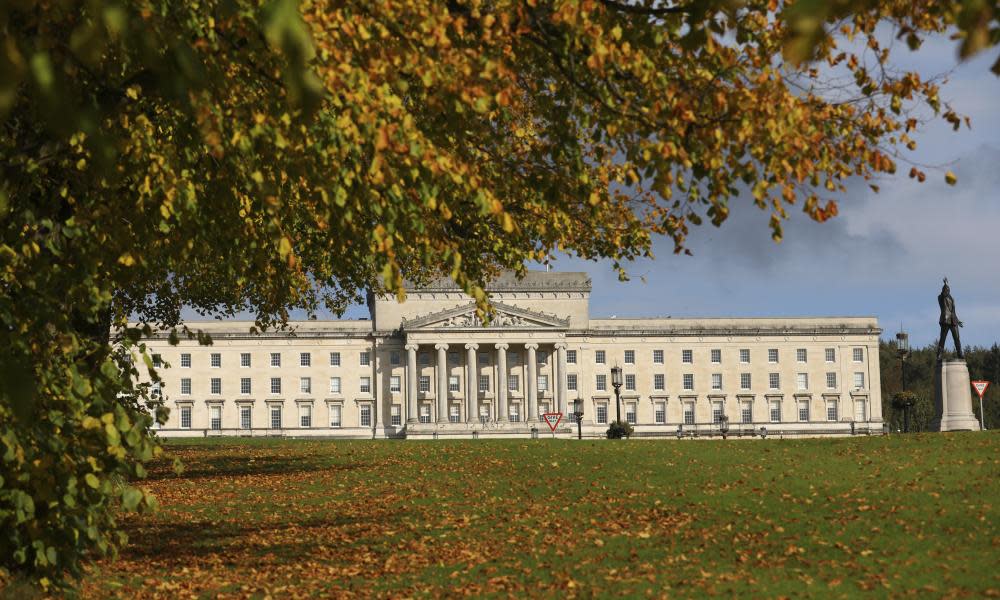DUP to return to Stormont to protest against abortion rights

Members of Northern Ireland’s assembly are due to return to the mothballed chamber on Monday for the first time in almost three years to protest against the extension of abortion rights to Northern Ireland.
The Democratic Unionist party (DUP) and other anti-abortion members will stage what is expected to be a largely symbolic recall of the assembly at Stormont.
The region’s near-blanket ban on abortion is due to end at midnight on Monday after a historic vote in the House of Commons last July to bring Northern Ireland into line with the rest of the UK.
Last week the anti-abortion campaign group Both Lives Matter said 31 members of the legislative assembly (MLAs), including 27 from the DUP, signed a petition to force a recall to discuss a motion to put abortion rights back in the hands of local politicians.
However to block the law the special sitting will need to elect a speaker and form an executive, which would require Sinn Féin’s support. Sinn Féin – along with the Alliance party – said it would not participate, leaving the anti-abortion gathering devoid of power.
Arlene Foster, the DUP leader, said the recall would allow MLAs to register opposition to the law. “Hopefully we will be able to debate the issue,” she said.
Several unionists from other parties backed the petition: Jim Allister of Traditional Unionist Voice, alongside Robin Swann, the leader of the Ulster Unionist party (UUP) and his party colleagues Robbie Butler and Roy Beggs.
The initiative came from former police ombudsman Nuala O’Loan, who wrote a letter to Julian Smith, the Northern Ireland secretary, requesting a recall before the abortion law change.
Same-sex marriage is also due to become legal on Tuesday after a separate Westminster vote in July. The first weddings can take place on Valentine’s Day next year.
Non-unionist parties criticised the recall. A Sinn Féin spokesperson called it “a pointless political stunt which has literally no impact, unless its business is to appoint an executive who does have the power to effect legal change”.
Colum Eastwood, the SDLP leader, also called it a stunt and said the legislation on abortion and same-sex marriage would take effect. Eastwood did not indicate whether the party would attend. One SDLP MLA, Daniel McCrossan, said he would attend.
Stephen Farry, an Alliance party MLA, told the BBC: “I’m profoundly uncomfortable that the first time people are making an effort to have the assembly reconvened is to discuss how we can deny people rights.”
Stormont collapsed in January 2017 amid disputes between the DUP and Sinn Féin, leaving a political vacuum. Despite mounting frustration efforts to revive it have failed.
Long campaigns by equality campaigners culminated in two Labour MPs, Stella Creasy and Conor McGinn, tabling amendments on abortion and same-sex marriage to an otherwise technical government bill connected to budgets and elections for the defunct assembly. In free votes, because they were viewed as matters of conscience, the Commons voted overwhelmingly for both.
On the eve of this week’s vote on Boris Johnson’s Brexit deal, Creasy accused Downing Street of preparing to hand back control of abortion rights to Stormont to help curry favour with the DUP. If there was such a plan it failed: the DUP rejected Johnson’s deal.
Grainne Teggart, Northern Ireland campaigns manager for Amnesty UK, said using abortion rights as a bargaining chip to restore devolution was appalling.
She said: “Abortion rights have been long and hard fought for and we will not accept them being sacrificed for political expediency. It would be foolhardy of any political party to think otherwise.”
Smith is continuing efforts to revive Stormont, where he has spent the week meeting political leaders. All sides agree the vacuum has damaged public services and trust in politics.

 Yahoo News
Yahoo News 
